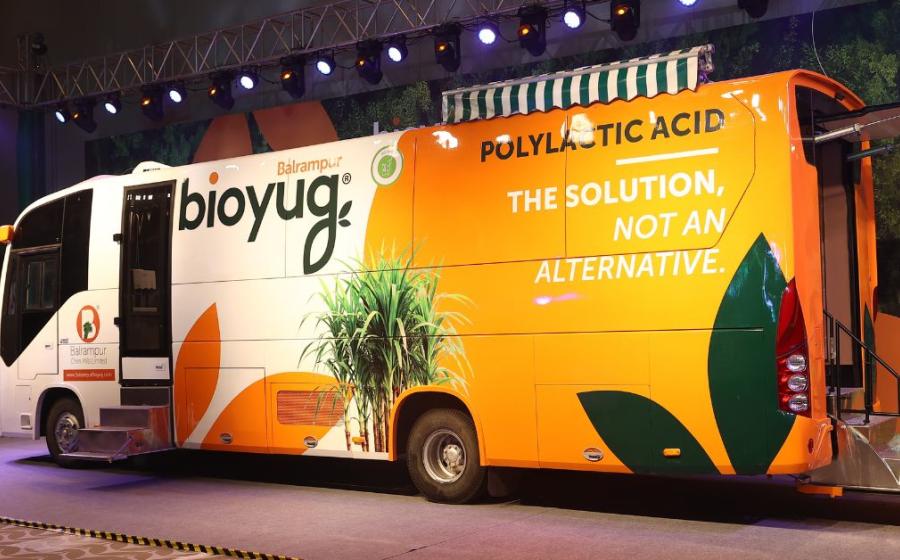
In a bold stride toward a more sustainable future, Balrampur Chini Mills Limited (BCML) has officially launched Balrampur Bioyug, India’s first industrial-scale PLA bioplastics brand, signaling a groundbreaking shift in the country’s approach to plastic, agriculture, and climate-conscious industry.
Launched on May 27, 2025, by Maharashtra Deputy Chief Minister Devendra Fadnavis in Mumbai, Bioyug marks not just a new product but the beginning of a new paradigm: one where plastic isn’t made from oil, but from crops like sugarcane.
The upcoming plant, scheduled for commissioning in October 2026 in Kumbhi, Uttar Pradesh, will be the world’s first fully integrated PLA (polylactic acid) biopolymer facility — taking sugarcane from crop to bioplastic resin entirely in one place, and powered 100% by renewable energy. Once operational, the plant is expected to produce 80,000 tonnes of PLA annually, offering a compostable, bio-based alternative to millions of plastic bottles and packaging units currently flooding landfills.
“We haven’t just unveiled a brand — we launched a transformative movement,” said Avantika Saraogi, Executive Director of BCML. “Balrampur Bioyug represents ‘The Era of Bio-Circularity’ — where agriculture meets innovation, and sustainability is the default.”
From Legacy to Leap
The roots of this revolutionary idea trace back not to a lab, but to the legacy of Avantika’s grandmother, fondly known as Madamji, who once oversaw BCML’s sugarcane operations. Upon taking the reins, Avantika asked a simple yet profound question:
“What more can we do with what we already have?”
The answer: turn sugar into sustainable packaging.
Her curiosity was sparked by a sugarcane-based bottle labeled “I’m made from plants”. That vision, nurtured with strategy and science, is now poised to reshape India's plastics landscape.
Why Sugarcane?
India is the second-largest producer of sugarcane globally, generating over 400 million tonnes annually. Typically used for jaggery, sugar, and ethanol, the crop also yields enormous quantities of byproducts like bagasse and molasses — previously underutilized. PLA technology allows BCML to convert this agricultural residue into compostable bioplastics, enabling a truly circular model.
“Sustainability is in our DNA because we’re rooted in agriculture,” said Avantika. “This is about doing more with less — not just for the planet, but for farmers too.”
The Science Behind Bioyug
PLA is made through a four-step process: fermenting sugar to produce lactic acid, purifying it, converting it to dimers, and finally polymerizing it into PLA resin. The result is a plastic alternative that decomposes into compost under industrial conditions — often in just a few weeks.
Because BCML’s plant runs entirely on renewable energy from agri-waste, the PLA it produces will have up to 80% lower carbon emissions than petroleum-based plastics.
“This will be bio-based plastic made by bio-based energy. Everything comes from the earth and goes back to the earth,” Avantika added.
Farmers at the Center
More than 550,000 farmers are associated with BCML, and Bioyug places them at the core of its model. The project has already created 250 jobs, with over 2,000 more anticipated through a proposed bioplastics cluster.
“Our farmers now say with pride, ‘We grow for a bioplastics plant,’” Avantika noted.
A National Mission
India currently produces over 5 million tonnes of single-use plastic waste annually. Amid tightening regulations and rising climate risks, Bioyug emerges as both a timely solution and a national opportunity.
“India has something the world desperately needs: biomass and intent,” said Stefan Barot, President of BCML’s Chemical Division. “Unlike coal-based chemical production in China, we can leapfrog with bio-based alternatives.”
BCML isn’t waiting for policy to catch up. The company is working with governments to pilot waste segregation and composting programs in rural areas, setting the stage for truly circular infrastructure.
“It’s not complicated,” Stefan said. “Just dry and wet waste. Our grandparents knew this — we’ve simply forgotten.”
Looking Ahead
By 2026, Bioyug aims to revolutionize packaging, biomedical materials, food service ware, and more. Beyond PLA, BCML is exploring other biomaterials and green chemicals, pushing for deep-rooted change.
“Net Zero 2070 won’t happen on its own,” said Avantika. “It requires all of us — and we’re doing our part.”



